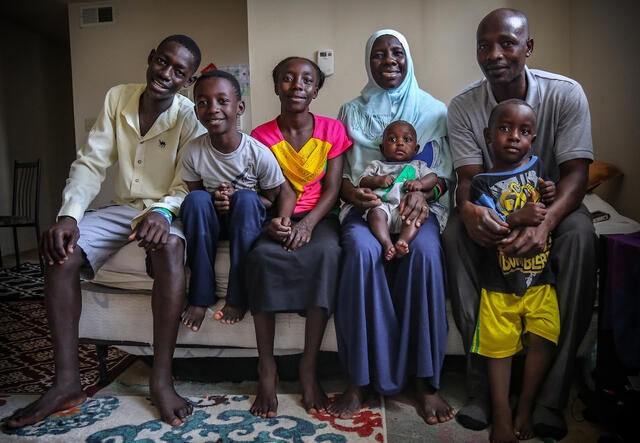
During the winter 2016 semester, Joseph Mears worked as an intern at the IRC in Silver Spring with the Intensive Case Management Program (ICM). He plans to graduate with his bachelor’s degree in Engineering Physics and Arabic in the spring of 2018.
While interning with the ICM program, Joseph mostly worked with refugees and their family members who had complex medical conditions like past or recurring trauma, and required additional support navigating the U.S. healthcare system. The ICM program also serves single parents who need additional resources and guidance getting back on their feet.
In addition to volunteering his time to help with case management, Joseph felt compelled to do more after working so closely with refugee families. He knew that if he shared his experiences of working with medically vulnerable families with his network back home he could rally more support. After talking with his mother and family back in Massachusetts, they felt compelled to do more to support refugees in the U.S. With support from his local community, his mother organized a donation drive where individuals could sign up to donate money, household items, clothing, and toys to clients at the IRC in Silver Spring.
Over the next two weeks, donations flooded into his family’s home as people dropped off items they signed up to donate. Money was donated to support client’s dental procedures and electricity bills, along with items including toys, clothes, and shoes. One 9 year-old boy wrapped up all of his Pokémon cards to put with a children’s clothing donation as a surprise, three other children donated their Gameboy’s, and another his soccer cleats. Everyone who dropped off donations communicated how glad they were to help support refugees in the U.S. and the IRC’s work.
After the end of the drive, Joseph’s mother and sister drove down to Maryland to drop off the donations that were collected, leaving the ICM team in Silver Spring with the fortunate task to distribute the supplies to families enrolled in the program. Each time Joseph brought donations to a family’s home, they were thrilled and deeply grateful, not only for the items, but for the community support each donation represented.
Joseph recounted some of the reactions clients had after receiving the donations that were collected.
Rihan, a fourteen-year old girl from Sudan who has been blind since birth, sat with a smile on her face as she squeezed and fiddled around with her new fidget toys.
Albertina, a woman from the Democratic Republic of Congo, laughed and repeated one of the few English phrases she knows, “Thank you!” as her six children’s eyes widened when they saw they each had their own bag of new clothes.
Petit, her five-year old son, later raced around his apartment with a massive smile on his face when he found the toy cars that had been put in his bag.
Faraja, a man from the Democratic Republic of Congo, eagerly showed Joseph how he looked in his new cleats, shin pads, and socks, excited to be able to try them out that weekend at a local park.
Although most people who donate items to the IRC are not around to see families receiving the donated items, all supplies donated to the office have a significant positive impact in the lives of IRC clients. Donation drives, like the one organized by Joseph’s mother, directly support the families served by the IRC and complement the work done by staff at our office. Continued community support through initiatives like donation drives alleviate some financial concerns for clients as they start rebuilding their lives in the U.S. with determination and positivity.
Donations are a tangible reminder, for staff and refugees alike, that there are people across the U.S. who support the IRC’s work, and are invested in the success of IRC.